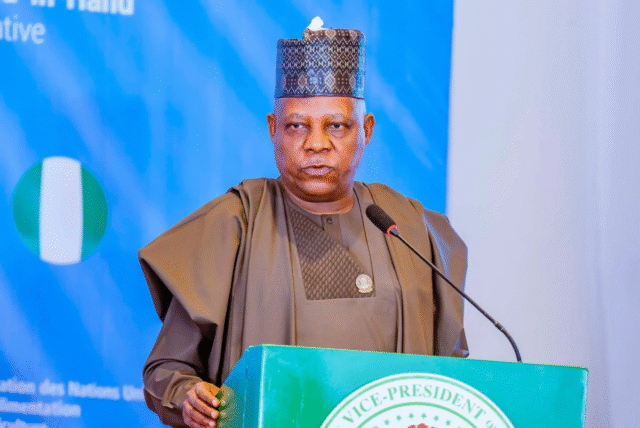Vice-President Kashim Shettima has identified education as a public investment with higher returns.
He also said every additional year in school increases lifetime earnings and reduces the risks of fragility and conflict.
Mr Shettima spoke at a high-level event organised by the Permanent Missions of Italy and Nigeria, along with Global Partnership for Education (GPE) in New York.
The event held on the margins of the ongoing 80th Session of the United Nations General Assembly (UNGA).
The event was hosted to discuss the opportunities investing in quality education presents to the world.
Mr Shettima noted that a well targeted education financing addresses the root causes of instability, extreme poverty and youth unemployment, noting that GPE multiplies impact through financing, policy support and targeted incentives.
According to him, GPE mobilises domestic resources and co-financing, multiplying the impact of every dollar invested.
Mr Shettima said GPE multiplier and co-financing mechanism had unlocked billions of funding beyond GPE’s grants.
He said, “GPE has a record of mobilising partners and delivering results at scale. Over recent years, the partnership has approved and disbursed significant grant volumes and leveraged innovative financing to reach millions of children. In 2024 alone, GPE approved over US$1.2 billion in new grants, and mobilised more than US$1.5 billion in cofinancing – evidence that the partnership’s model works when it is funded and prioritised.
“It is important to acknowledge that GPE cannot fulfill its mission without predictable and adequate replenishment. In the 2021– 2025 cycle, GPE raised approximately US$4.2 billion, a significant achievement, yet still short of what is needed to fully transform education.”
Mr Shettima said that Nigeria was expanding early childhood access, improving teachers training and investing in marginalised regions.
“A notable GPE grant in Nigeria is helping us to integrate religious schoolchildren into main stream education and train teachers across states, especially to support girls education,” he said.
He urged donors to safeguard and increase official development assistance for basic education.
Mr Shettima also urged donors to prioritise flexible and predictable funding to strengthen systems, and support targeted initiatives such as girls’ education accelerators that deliver significant social returns.
He further noted that fully funded replenishment would unlock the essential grants and technical assistance needed in the countries where the impact would be most profound.
“Nigeria stands ready to work with all partners to make GPE 2030 a turning point and replenishment that delivers both scale and measurable learning for the children we are privileged to serve. We hope that our collective action match the scale of our children’s promise, ” Mr Shettima added.
Responding, Chair, Board of Directors of GPE, Jakaya Kikwete, said the organisation would launch its most ambitious financing campaign to mobilise five million dollars investment.
He added that with the investment, GPE would remobilise another $10 billion from other innovative financiers.
He added, “Together, we will improve education for nearly 750 million children and train 10 million teachers by 2030. I’m delighted to announce that GPE already received 50 million dollars in early pledges from private and philanthropic donors. Transforming education system is essential so is transforming education financing. We must shift away from short- time fragmented support to long term sustainable investment strategies.”
According to Mr Kikwete, education gives reason to hope and opens new pathways to growth, peace and opportunity.
He added that in the past 50 years, education had given half of the global economic growth.
He stated, “But our concern today is the next 50 years, the largest generation of children and youths in history is coming of age. Most lives in sub-saharan Africa and in Asia. A quality education is not only their fundamental right but also the key to unlocking their potential.”
(NAN)




